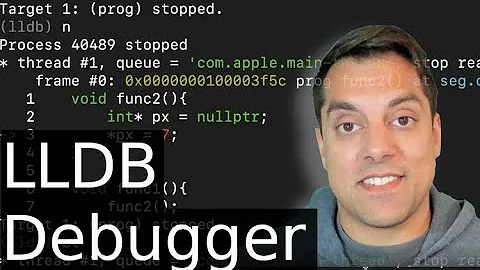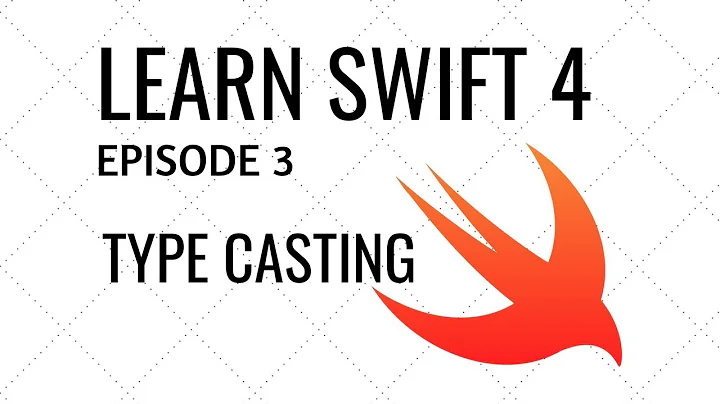LLDB (Swift): Casting Raw Address into Usable Type
Solution 1
Under Xcode 8.2.1 and Swift 3, the lldb command po or p won't work with the typed variable. You will need to use the swift command print to examine the properties of the typed object instance. (Thanks to cbowns's answer!) E.g.:
expr -l Swift -- import UIKit
expr -l Swift -- let $pin = unsafeBitCast(0x7df67c50, to: MKPinAnnotationView.self)
expr -l Swift -- print($pin.alpha)
Solution 2
You can use Swift's unsafeBitCast function to cast an address to an object instance:
(lldb) e let $pin = unsafeBitCast(0x7df67c50, MKPinAnnotationView.self)
(lldb) po $pin
Then you can work with $pin as usual – access properties, call methods, etc.
Check out this article for more information: Swift Memory Dumping.
Solution 3
The lldb format for expression seems to have changed in Xcode 7.3. The following got me started:
(lldb) expr -l Swift -- import UIKit
(lldb) expr -l Swift -- let $view = unsafeBitCast(0x7fb75d8349c0, UIView.self)
Solution 4
For Custom Classes you need to import your project
expr -l Swift -- import MyTestProject
expr -l Swift -- let $vc = unsafeBitCast(0x7fad22c066d0, ViewController.self)
expr -l Swift -- print($vc.view)
Solution 5
Objective-C version
po ((MKPinAnnotationView *)0x7df67c50).alpha
Related videos on Youtube
jarrodparkes
Jarrod Franklin Parkes I am software developer from Huntsville, AL.
Updated on July 08, 2022Comments
-
jarrodparkes almost 2 years
Is there an LLDB command that can cast a raw address into a usable Swift class?
For example:
(lldb) po 0x7df67c50 as MKPinAnnotationViewI know that this address points to a MKPinAnnotationView, but it is not in a frame that I can select. But, I want to cast the raw address into a MKPinAnnotationView so that I can examine its properties. Is this possible?
-
jarrodparkes about 9 yearsFor the first statement i think you forgot the 'expr' or 'expression'. Otherwise it is working great!
-
devios1 about 8 yearsI'm getting "error: use of undeclared identifier 'unsafeBitCast'" in Xcode 7.2.
-
carlos_ms about 8 yearsBesides that error (@devios) there's another error it shows in 7.3.1: "error: unknown type name 'let'"
-
Lucas van Dongen over 6 yearsThis really shouldn't be so hard
-
 mfaani over 6 yearsThis was a little counter intuitive. I thought I didn't need to type the
mfaani over 6 yearsThis was a little counter intuitive. I thought I didn't need to type the(lldb)in my console. But it didn't work without that. -
p0lAris about 6 yearsIs there a way to do this in objective-c?
-
 Patrick Pijnappel over 5 yearsNote that depending on context you might need to switch lldb to Swift mode first using
Patrick Pijnappel over 5 yearsNote that depending on context you might need to switch lldb to Swift mode first using(lldb) settings set target.language swift. Also, in some cases (e.g. when breaking outside of your app's module while casting to a type from your app) you might need to follow that with ae import MyApp -
Koen. over 5 yearsI keep getting back at this. I probably should create a lldb alias for
expr -l Swift --.. -
 Trev14 over 5 yearsThis worked perfectly for me. In my case I was in the
Trev14 over 5 yearsThis worked perfectly for me. In my case I was in theDebug View Hierarchyview, right clicked on a view, then selectedPrint description of.... That gave me a memory address and type I could drop into the code above. Nice to know that the visual debugger puts the console into an Obj-C frame. -
Alexander Stepanishin almost 5 yearsI'm getting error: no such module "MyProjectName". Any thoughts how to fix this?
-
Juanmi over 4 years@AlexanderStepanishin try setting the thread/stack path, Example: "MyApp > Thread 1 > 12 main"
-
tontonCD about 4 yearsfrom your link,
expression -l objc -O -- 0x76543210is just the response for me, and it doesn't need to know the variable class from the adress! -
Max Desiatov over 2 yearsAs was mentioned in a different answer to this question, typing
settings set target.language swiftonce is enough to avoidexpr -l Swift --in subsequent commands. -
 Bogdan Razvan over 2 years@AlexanderStepanishin you need to hit a breakpoint. It won't work if you interrupt the flow by pressing the Debug Memory Graph button in xCode.
Bogdan Razvan over 2 years@AlexanderStepanishin you need to hit a breakpoint. It won't work if you interrupt the flow by pressing the Debug Memory Graph button in xCode.








